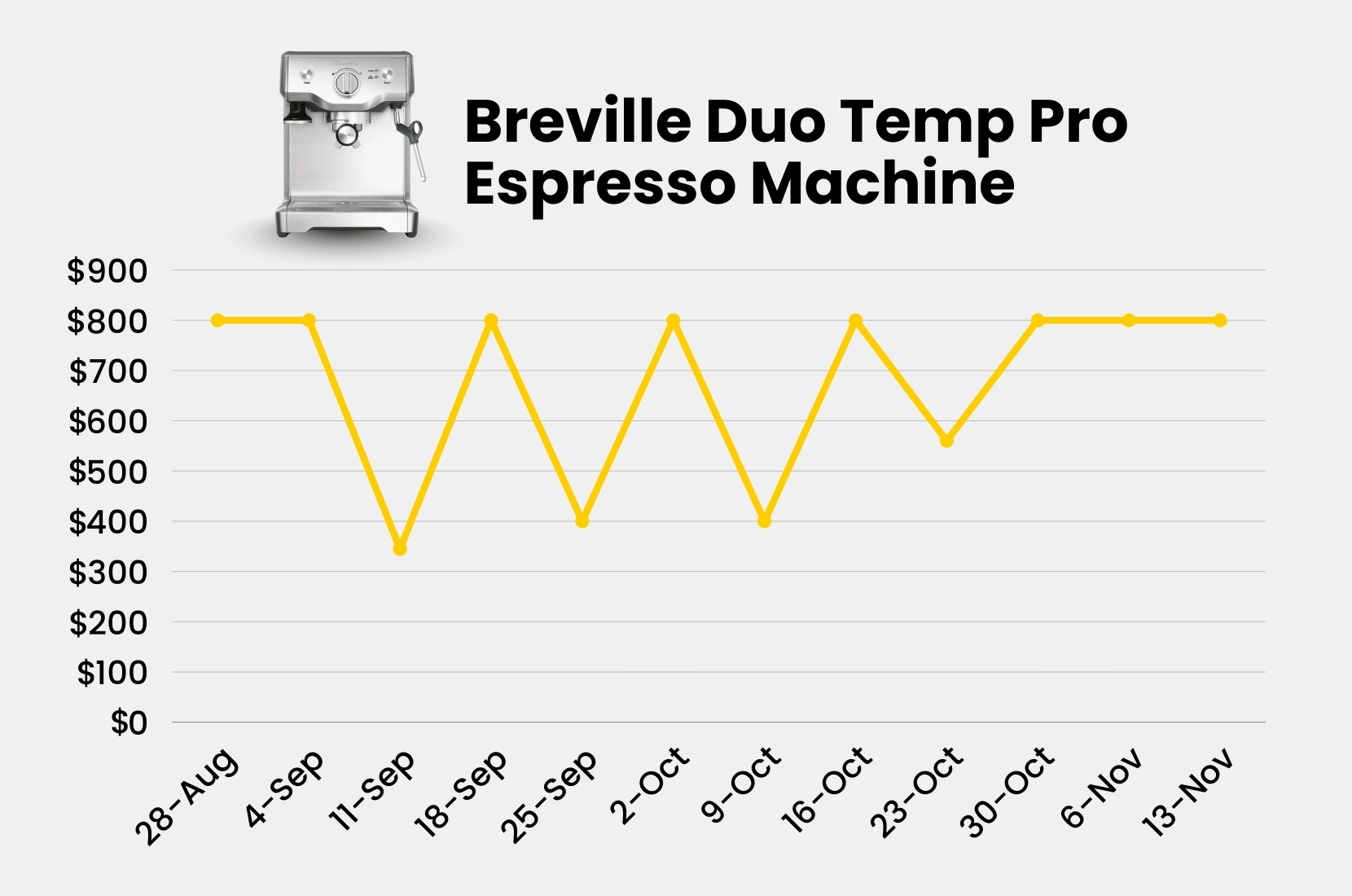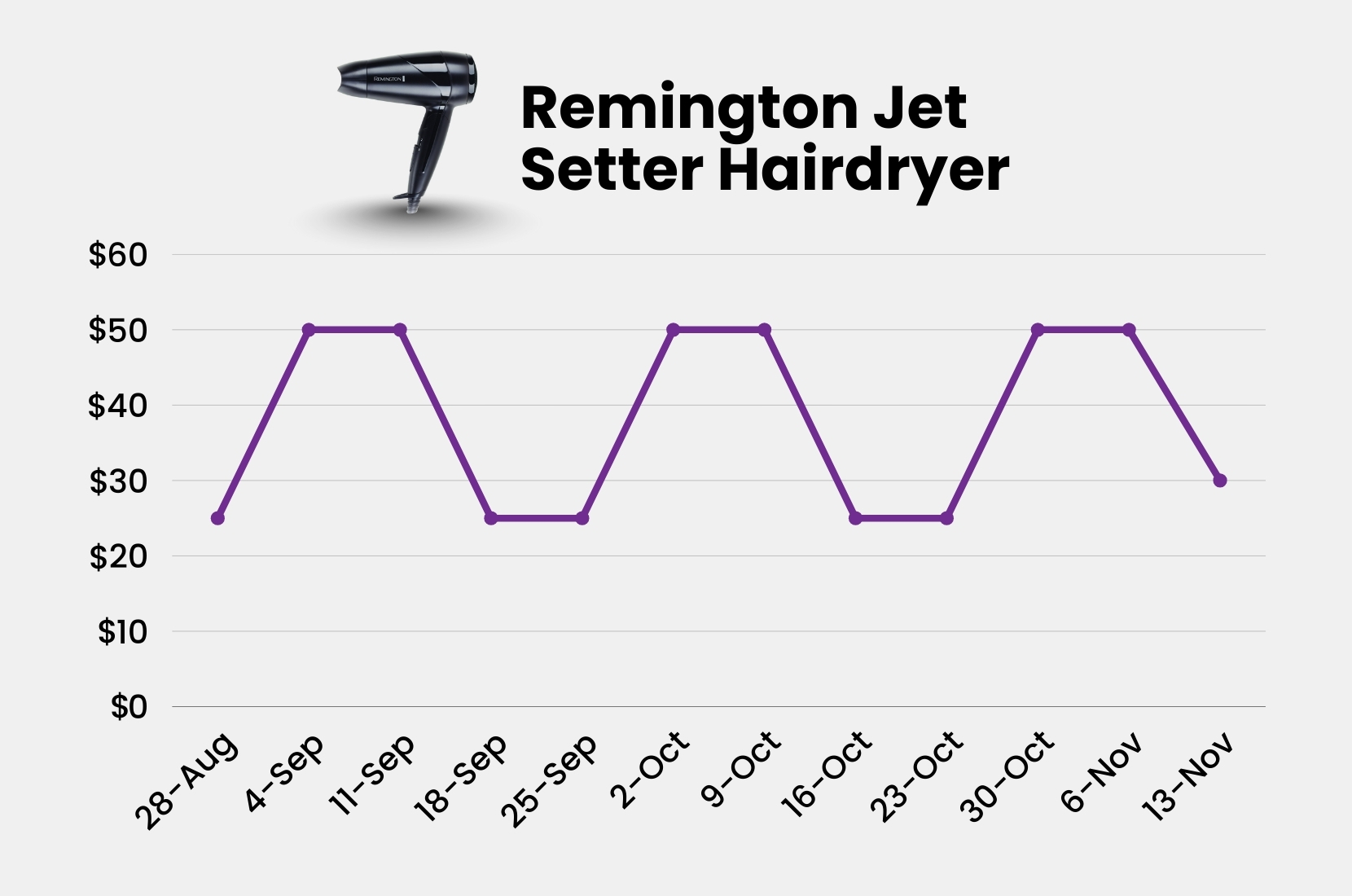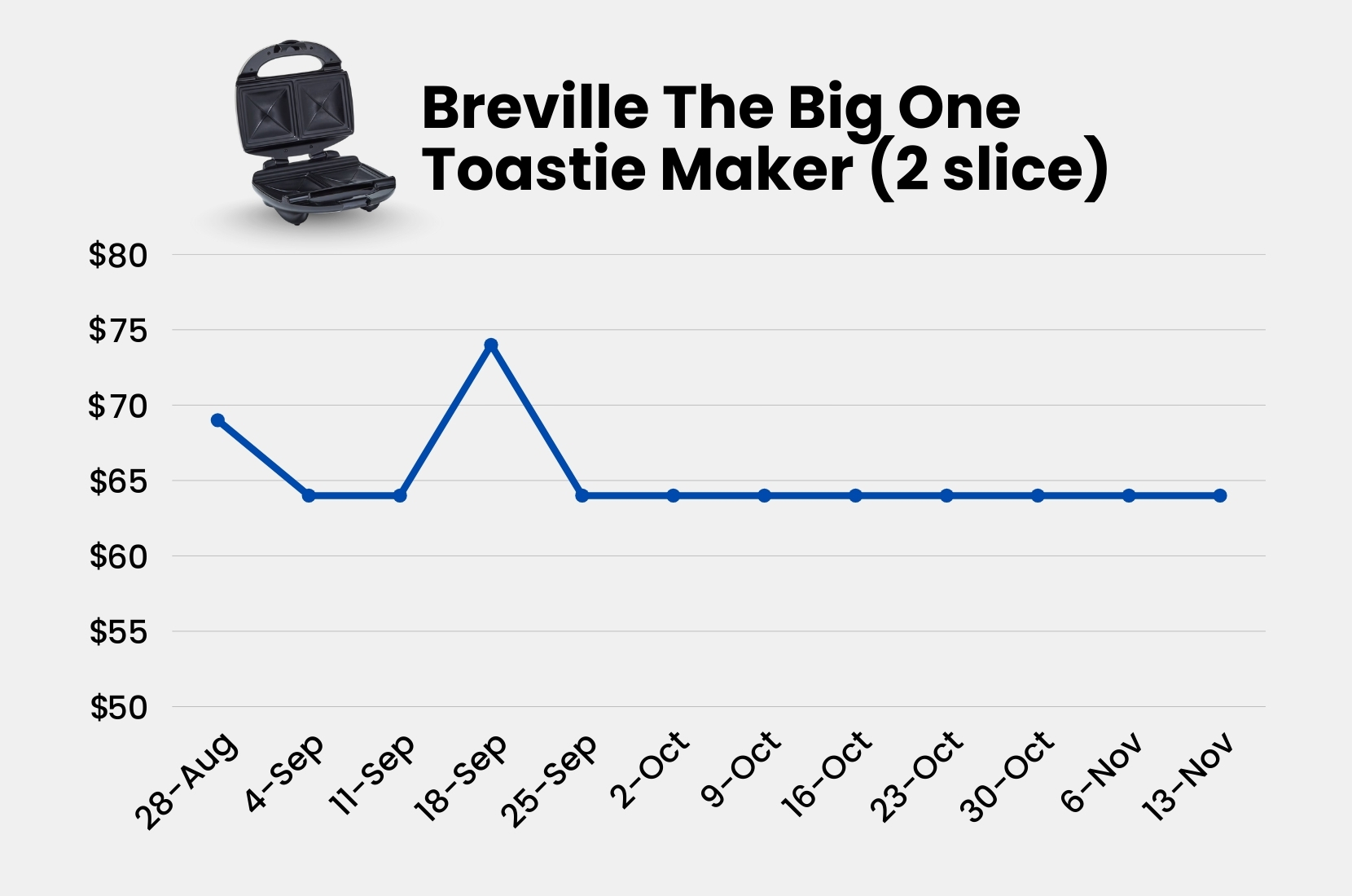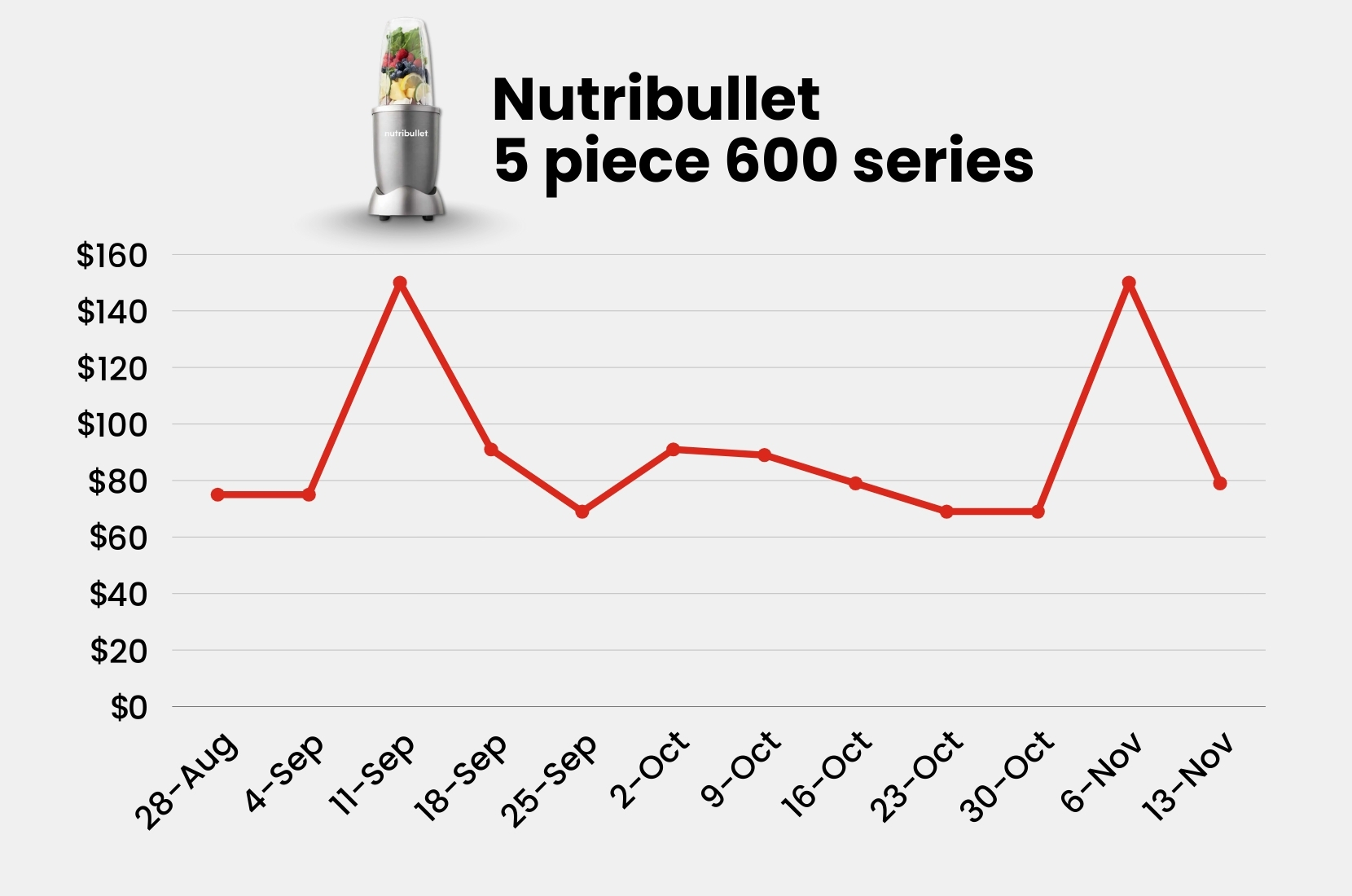Is it really on special?

We tracked 10 products across four big box retailers over 12 weeks. While two big retailers are playing by the ‘special’ rules, we think the other two are potentially misleading customers.

Briscoes
It happens so often, it’s become a standing joke in Aotearoa. So, you won’t be surprised to hear there are frequent specials at Briscoes.
Of the 10 products we tracked, nine were frequently on special at Briscoes. Most fell into a pattern of being on special for one or two weeks, and then the normal price for a week or two.
This is playing by the special rules, because it does offer shoppers a genuine opportunity to buy at a discounted price for a limited time before the price returns to its usual price.
The Breville Duo Temp Pro espresso machine’s normal price was $799.99, but it was discounted nearly every other week to between $349.97 and $559.99.

Based on the products we tracked, the most you’ll have to wait for a special on the kettle or toaster is 2 weeks.
There were two exceptions – the first, a Samsung Microwave (23L) that was a clearance item for 9 of the 12 weeks we tracked, and a ‘hot price’ for one week.
The second exception was a Dyson Cyclone V10 handstick vacuum cleaner that was also a clearance item for 9 of the weeks we tracked.
The ‘clearance’ sales tag should only be used when a retailer is getting rid of a product. For both products, they were out of stock for a few weeks, but then back on the shelf at the ‘clearance’ price.
A spokesperson for Briscoes said the microwave was no longer available; however, there is still stock of the Dyson vacuum cleaner. They explained they had brought in a new model of Dyson, which meant the older stock hadn’t sold, so was still available at the ‘clearance’ price.
Farmers
It’s a similar special pattern at Farmers where goods we tracked were on special for 2 weeks, then back to their usual selling price for the following 1 to 2 weeks.
The only exception was the Dyson Cyclone V10, which stayed at its usual price over the 12 weeks ($1,199).

Harvey Norman
For 10 of the 12 weeks, most products we tracked at Harvey Norman were promoted with deal-saving claims almost every week.
Harvey Norman stood out amongst its competitors for promoting its products as a “great price”, “super deal”, “huge deal” or a “massive stock sellout” for nine out of the ten products we tracked, nearly every week we tracked them.
So much so, that we awarded Harvey Norman a Yeah, Nah Award after we’d tracked its prices for 9 weeks.
This continual promotional pricing, designed to give customers the impression they’re paying less than they usually would, is potentially misleading and a breach of the Fair Trading Act.
In 2017, the Commerce Commission wrote to retailers reminding them of the rules around promotions. It noted that if a business constantly sells a product at a special price, that special becomes the usual selling price.
Harvey Norman said that it doesn’t make “promotional claims where a product is not being sold at a promoted price” and that its practices are consistent with the “industry approach to pricing and labelling decisions.”
Harvey Norman also said customers compare prices between retailers rather than checking the price of a product at the same retailer over time.
However, given the pricing concerns Consumer NZ has, Harvey Norman is reviewing its pricing practices “as a matter of priority”.
We have noticed that since we got in touch with Harvey Norman it has changed its specials language to “Now” pricing on the goods we tracked. We think customers could also think this bright red label suggests a product is on special.
While the price tags changed frequently, the prices only shifted a little.
We tracked a Russell Hobbs kettle that was on sale for 11 weeks straight; and was labelled a “great price” for 5 out of those 11 weeks. The “great price” ranged from $39.00 to $49.00. In the same price range, it was also labelled as a “super deal”, a “huge deal”, “now” and a “massive stock sellout”.

There was also a Breville toastie maker priced at $64 for 10 of the 12 weeks we tracked, during which it was variously labelled as a “great price, “super deal”, “massive stock sellout”, “now” and even a “huge deal”.
We would argue that $64 is the toastie maker’s normal price rather than a special.

Noel Leeming
Noel Leeming also uses the word “now” on its online pricing to show products are cheaper than their usual price.
Yet, the “Now” price jumps around week to week.
The Breville Duo Temp Pro coffee machine was labelled with “now” pricing for 11 out of the 12 weeks we tracked, with the price ranging from $649 to $829. It was at its usual price for just one week ($1,149).
A Samsung microwave was labelled with “now” pricing for 12 weeks, but the price jumped between $217 to $289.
The Remington Jet Setter hairdryer was also labelled at “now” pricing for 9 of the 12 weeks we tracked, appearing to be at its usual selling price for just 3 weeks.
The Nutribullet also appeared to be on special for 10 out of the 12 weeks, but the price varied from $69 to $149.99.
A spokesperson for Noel Leeming said, “the price often changes in line with what other retailers are promoting or selling that product for in the market. We do this to ensure we are offering our customers the best possible price.”
We think this continual “now” promotional pricing could give customers the impression they’re paying less than they usually would at Noel Leeming. But this isn’t necessarily true, so we think it could be misleading and a breach of the Fair Trading Act.
At Noel Leeming, half of the products we tracked were advertised with “now” pricing for 9 or more weeks over the 12-week tracking period.

It pays to shop around
Where we could, we tracked the same products across the four retailers. We found it pays to shop around to get the best deal.
In our tracking, the cheapest price for the Russell Hobbs kettle was $19 at Noel Leeming, while the best deal offered for the same kettle at Briscoes and Farmers was $49.99, and the cheapest price at Harvey Norman was $39.
You could save just over $30 by comparing the prices across retailers.
You can use Priceme and PriceSpy to compare prices at several retailers. The graphs on these sites show you the prices that stores have been charging for an item – so you can tell if you’re really getting a good deal.
Also check if the store you’re thinking of buying from has a price guarantee, which is when they’ll match or beat the price of another store.
You can access price guarantees online with most big box retailers. If you’re buying an item at full price, check if the retailer has a price promise, so you can get some money refunded if the product goes on sale soon afterwards.
The ‘special’ rules
A sale must be a genuine opportunity for shoppers to buy a product at a discounted price for a short period of time.
If a business continually sells a product at a discounted price, then that’s the usual selling price – it’s not a special.
When a retailer compares a sale price with a previous price (for example “was $100, now $50”), the "was" price must be the true price the goods were sold at for a reasonable time.
The retailer also should not inflate the normal price of a product, knowing it won’t be bought at that price, only to discount it to get sales.
Clearance sales create a sense of urgency. They should only be used for clearing stock. You shouldn’t see clearance stock back on the shelves at full price after the sale has ended.
For more tips on shopping the sales, see our advice on 10 things stores must not do.
Member comments
Get access to comment